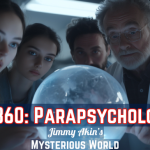
 Jimmy Akin's Mysterious World
Jimmy Akin's Mysterious World The Mystery of Parapsychology
6 snips
Apr 11, 2025 Dive into the intriguing world of parapsychology, exploring the science behind ESP and psychokinesis. Discover the nine foundational principles that define this field and how it differentiates itself from spirituality and the occult. The discussion spans out-of-body and near-death experiences, awakening curiosity about what lies beyond death. Through captivating case studies, the mystery of reincarnation unfolds, while the nuanced relationship between consciousness and the paranormal is examined. Engage with this fascinating journey into the unknown!
AI Snips
Chapters
Books
Transcript
Episode notes
Parapsychology's Focus
- Parapsychology studies psychic phenomena and survival, not topics like UFOs or cryptids.
- It uses the scientific method, conducting experiments and analyses.
Parapsychology as Science
- Parapsychology is a science that uses the scientific method, not just theories.
- It's recognized by major scientific organizations like the AAAS.
Distinguishing Parapsychology
- Parapsychology is distinct from spirituality, religion, New Age, and the occult.
- It focuses on psychic function and survival.





 What is parapsychology? Jimmy Akin and Dom Bettinelli unravel this misunderstood science—from ESP and PK to life after death—while Jimmy shares the 9 foundational principles that summarize this field of research.
What is parapsychology? Jimmy Akin and Dom Bettinelli unravel this misunderstood science—from ESP and PK to life after death—while Jimmy shares the 9 foundational principles that summarize this field of research.